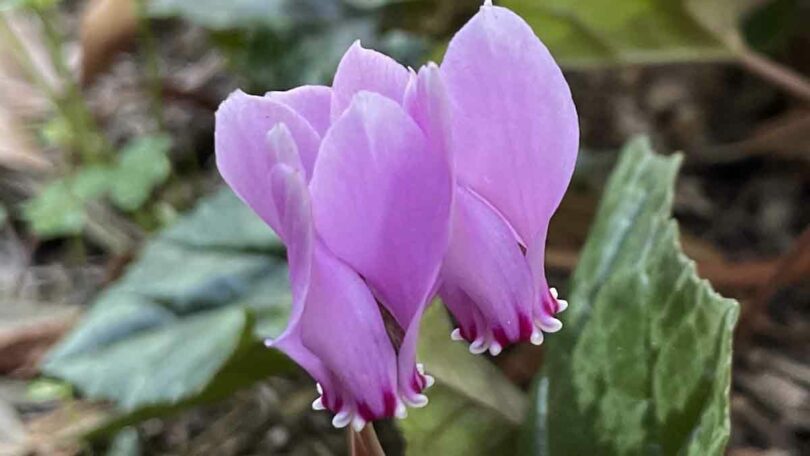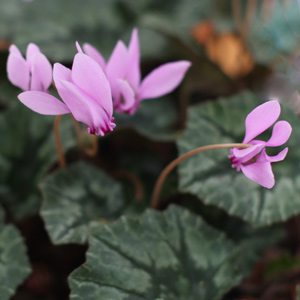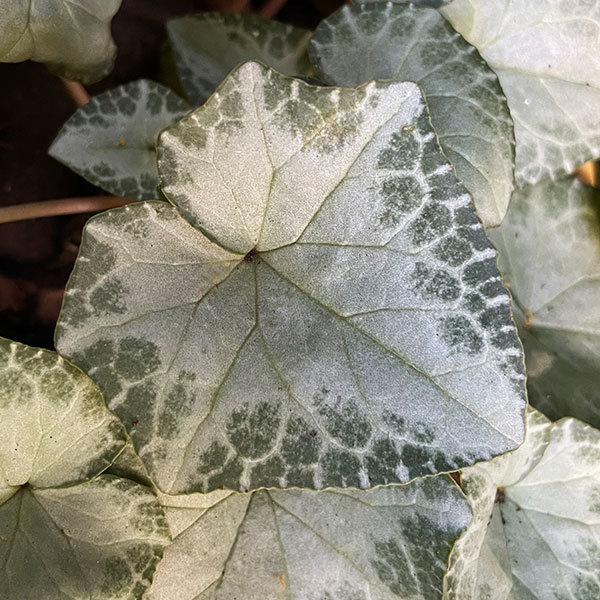The wonderful world of Cyclamen provide gardeners with a hardy group of plants, very attractive flowers and many with excellent foliage as well.

This is a varied group of plants, some preferring shade, others growing well in full sun.
The plants that we see at the florists are just one part of this fascinating genus.
Generally Care is easy, we provide full notes separately for the most popular species.

Cyclamen for Indoors and Outdoors
You can grow Cyclamen both indoors and outdoors, growing outdoors depends greatly on matching your climate and soil to the right species
It is the cultivars of C. persicum, commonly called florists cyclamen that are widely grown indoors. The species itself C.persicum can also be grown outdoors.
Other popular varieties available for sale include the popular C. coum and hederifolium.
Although they are often grown as indoor plants, they are actually a wonderful garden plant when grown in the right conditions.
For some this will be dappled shade, while other species appreciate full sun. Although they are promoted for the flowers, many species also have excellent foliage and will form a good dense clump over time.
Most species can be left for many years in the garden, a little fertiliser in spring and perhaps some water during long dry spells when they are in active growth is all that they require. They will multiply and be divided if they become to crowded.
In general they are a perennial plant that grow from a surface or underground tuber or bulb depending on species (20 plus species have been identified)
Most species are shade lovers, a few are sun lovers. some are spring flowering species such as C. alpinum, C. coum, elegans and persicum, others are autumn flowering such as C. cilicium, graecum and hederifolium.
A Cyclamen For All Seasons

Not only do different species flower at different times of the year, they also have varying foliage in both colour and pattern as well as shape, from green to silver and from rounded to lance shape.
This makes these wonderful woodland plant an attraction in the garden almost year round and for foliage as well as flowers.
Cyclamen graecum
This a bit of an oddity in that it likes to grow in a hot dry position. The corms take many years to establish but C.graecum is well worth the wait.
This is a species noted for the beauty of its leaf markings and it flowers in late summer to autumn.
Cyclamen persicum
This is the most common form grown commercially, C. persicum is the variety most often sold in large nurseries and florists, sometimes called the ‘florists cyclamen’).
Always available in pots and often grown indoors. C. persicum does not like frosts and does not like cold weather. In warmer climates it is happy in the garden.
Cyclamen coum
Blooming from winter through to spring C. coum is a tough plant and can be left to naturalize in the garden, not afraid of cold weather this species grows well in dappled shade (a great woodland plant). C. Coum requires a well drained soil and a little mulch in summer.
Cyclamen hederifolium
Another great woodland plant from originally from Europe (France, Bulgaria through to Crete). C. hederifolium will grow in full sun (protect from hot afternoon sun in Australia) and enjoys a position beneath deciduous trees growing in the decomposing leaves (leaf mould or leaf litter).
Other species include:
C. africanum, creticum, balearicum, cilicium, cyprium, intaminatum, libanoticum, mirabile, parviflorum, pseudibericum, purpurascens, somalense and trochopteranthum.
More Resources
Plants are available for sale from the following nurseries
601 Sunnyholt Road Parklea NSW 2768
Parklea Pots and Plants are affordable, open 7 days and have everything you need for your garden - of any size!. Pots, plants, water features, fruit trees, hedging, potting mix and more.
Opening hours 7 days a week from 8:30am to 5pm
www.potsandplants.com.au
138 Olinda-Monbulk Rd, Olinda VIC 3788
"Large range of rare and unusual plants.."
www.gentiananursery.com.au
Online and Retail Melbourne and Geelong based garden centres. Check out their large range of indoor and outdoor plants, Australian Natives, Fruit Trees and Edibles, Succulents, Gardenias, Camellias, Hydrangeas plus a full range garden products for delivery in Melbourne.
www.diacos.com.au
357 Monbulk Road SILVAN VIC 3795
Guaranteed "garden worthy" bulbs, plants and perennials. Visit the website to browse our large range of daffodils or request the latest free catalogue.
www.tesselaar.net.au
470 Monbulk-Silvan Road Monbulk VIC 3793
"Guaranteed mail order flowering bulbs, perennials, roses, trees, landscaping plants, garden accessories and community fundraising Austra lia-wide."
www.gardenexpress.com.au
125 Palmer Rd Jindivick 3818
Open Thursday - Sunday 10am - 4pm
Specialising in growing and selling Rare and Unusual Trees, shrubs Perennials Bulbs and Climbers, a unique nursery with amazing stock.
www.muskersbroughtonhall.com.au
2 Jacksons Hill Rd, Menzies Creek VIC 3159
Hundreds of different varieties of daffodils as well as other beautiful spring & autumn flowering bulbs for home gardeners. Free colour catalogues available. Tulips, Daffodils,Alliums, Freesias, Iris and many other bulbs.
www.daffodilbulbs.com.au











